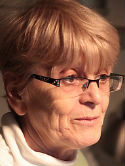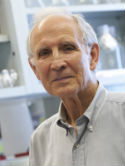| Abstract: |
The c-kit receptor tyrosine kinase belongs to the PDGF/CSF-1/c-kit receptor subfamily. The kit-ligand, KL, also called steel factor, is synthesized from two alternatively spliced mRNAs as transmembrane proteins that can either be proteolytically cleaved to produce soluble forms of KL or can function as cell-associated molecules. The c-kit receptor kinase and KL are encoded at the white spotting (W) and steel (Sl) loci of the mouse, respectively. Mutations at both the W and the Sl locus cause deficiencies in gametogenesis, melanogenesis and hematopoiesis. The c-kit receptor is expressed in the cellular targets of W and Sl mutations, while KL is expressed in their microenvironment. In melanogenesis, c-kit is expressed in melanoblasts from the time they leave the neural crest and expression continues during embryonic development and in the melanocytes of postnatal animals. In gametogenesis c-kit is expressed in primordial germ cells, in spermatogonia, and in primordial and growing oocytes, implying a role at three distinct stages of gametogenesis. Many mutant alleles are known at W and Sl loci and their phenotypes vary in the degree of severity in the different cellular targets of the mutations. While many W and Sl alleles severely affect primordial germ cells (PGC), several mild Sl alleles have weak effects on PGCs and exhibit differential male or female sterility. Steel Panda (Sl(pan)) is a KL expression mutation in which KL RNA transcript levels are reduced in most tissues analyzed. In female Sl(pan)/Sl(pan) mice, ovarian follicle development is arrested at the one layered cuboidal stage as a result of reduced KL expression in follicle cells, indicating a role for c-kit in oocyte growth. W(sh) is a c-kit expression mutation, which affects mast cells and melanogenesis. While the mast cell defect results from lack of c-kit expression, the pigmentation deficiency appears to stem from ectopic c-kit receptor expression in the somitic dermatome at the time of migration of melanoblasts from the neural crest to the periphery. It is proposed that the ectopic c-kit expression in W(sh) mice affects early melanogenesis in a dominant fashion. The 'sash' or white belt of W(sh)/+ animals and some other mutant mice is explained by the varying density of melanoblasts along the body axis of wild-type embryos. |
| Keywords: |
signal transduction; controlled study; oncoprotein; gene mutation; genetics; mutation; proto-oncogene proteins; review; nonhuman; conference paper; animal cell; mouse; phenotype; animal; mice; animal tissue; stem cell factor; stem cell factor receptor; melanocyte; embryo; protein degradation; embryo development; platelet derived growth factor receptor; protein tyrosine kinase; infertility; ovary follicle; physiology; pigmentation; membrane protein; ligand; alternative rna splicing; hematopoiesis; neural crest; receptor; receptor protein-tyrosine kinases; pleiotropy; melanogenesis; colony stimulating factor 1; hemopoietic growth factor; oocyte development; kit-ligand; gametogenesis; spermatogonium; colony stimulating factor receptor; human; male; female; priority journal; support, non-u.s. gov't; support, u.s. gov't, p.h.s.; primordial germ cell; support, u.s. gov't, non-p.h.s.; dermatome; hematopoietic cell growth factors; c-kit receptor; proto-oncogene protein c-kit; receptors, colony-stimulating factor; proto oncogene protein c kit; proto oncogene proteins; receptor protein tyrosine kinases; receptors, colony stimulating factor; white spotting (w) and steel (sl) mutations
|




